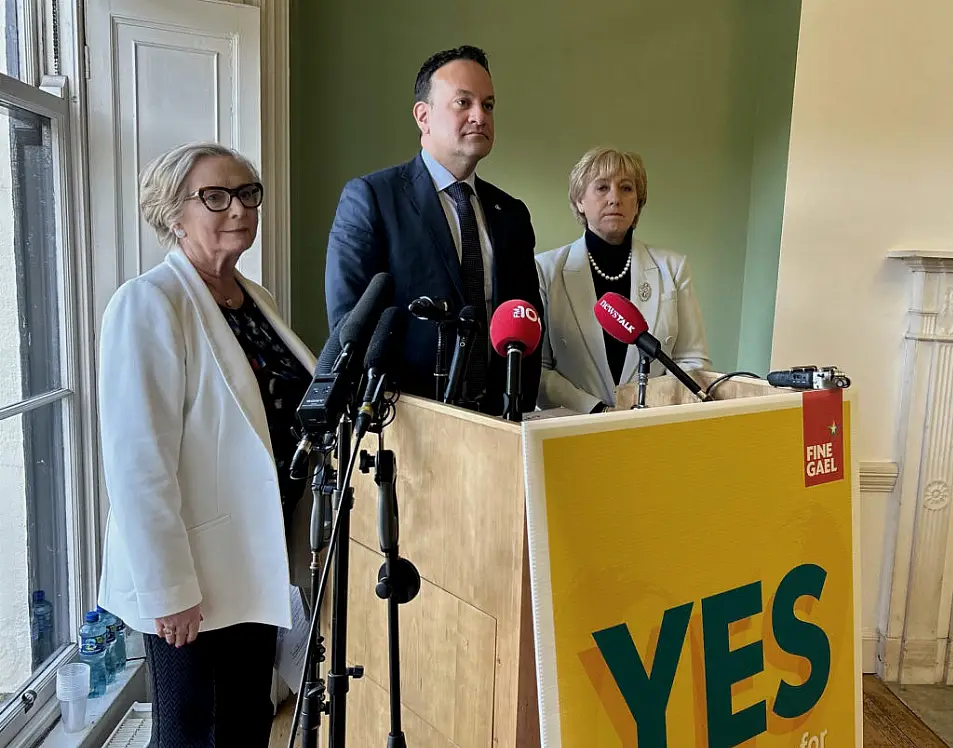What are we voting on?
On Friday, March 8th, Irish citizens will be asked to vote in two referendums to change the Constitution to provide for a wider concept of family and women’s role in society.
The proposals, called the family amendment and the care amendment, would make changes to the text of Article 41 in the Constitution.
What is the family amendment?
The family amendment would extend the definition of the family beyond those relationships based on marriage.
The constitutional protection given to families would cover both families based on marriage and families founded on “other durable relationships”.
Specifically, the proposal involves inserting additional text to Article 41.1.1 of the Constitution and the deletion of text in Article 41.3.1.
And what is the care amendment?
The care amendment would remove the clause in the Constitution that references a woman’s life and a mother’s duties in the home and replace it with a recognition of care within the family.
If the referendum passes, language in Article 41.2 around “duties” of women in the home would be replaced with a new Article 42B, providing that the State will “strive to” support care within families.
Why are we voting on this now?
The Constitution’s references to the role of women in the home and the family based on marriage have long been seen as outdated by equality campaigners.
Constitutional change was ultimately recommended by the Citizens’ Assembly on gender equality in 2021 and by a special joint Oireachtas committee in 2022.
One of the key recommendations made by the Citizens’ Assembly was for a referendum to be held to delete and replace Article 41.2 of the Constitution.
It also recommended the use of language that was not gender-specific and that would oblige “the State to take reasonable measures to support care within the home and wider community”.
However, the wording being put to citizens in the referendum says the State “shall strive to support” the provision of care by family members to one another.
Where do the political parties stand?
Fine Gael, Fianna Fáil, Sinn Féin, the Green Party, Labour, Social Democrats and People Before Profit are all calling for a “Yes-Yes” vote.
Taoiseach Leo Varadkar said the changes would still allow the Constitution to continue its history of protecting both the family and the institution of marriage.
“Repurposing the wording, however, acknowledges that families may also be founded on lasting relationships other than marriage,” he said.

Tánaiste Micheál Martin said the Constitution was the bedrock of the law and government but that the proposed changes “reflect the values of an inclusive and compassionate country – they reflect the reality that many more diverse models of families make up our society today”.
Minister for Integration Roderic O'Gorman said the “archaic and sexist reference” to a woman's place in the home had “contributed nothing good to the lives of women in this country.”
However, Opposition parties have expressed concerns about the care amendment. Labour leader Ivana Bacik said the proposed changes are a “step forward” but her party would continue to push for better support for carers after the votes in March.
Sinn Féin leader Mary Lou McDonald said the care amendment was “an opportunity missed” by the Government, and accused it of having an “abysmal track record” on families and carers.

Beyond Leinster House, the key forces on the side of change are the National Women’s Council, Family Carers Ireland, One Family and Treoir.
The National Women’s Council, made up of more than 190 member groups, is advocating a Yes-Yes vote in the two referendums and the organisation’s director Orla O’Connor is leading the campaign.
So who is against the proposals?
The only Dáil party against both proposals is Aontú. The party does not intend to spend any money, print any posters or leaflets or canvass for the referendums. But a spokesman for party leader Peadar Tóibín told The Irish Times that the party has adopted a No position and that Mr Tóibín would be featuring in media debates on the issue.
Some Independent TDs and Senators, such as Mattie McGrath and Ronán Mullen, are also advocating for a No vote in both referendums.
Senator Michael McDowell has published and distributed an eight-page leaflet outlining his reasons for rejecting both amendments.
The Free Legal Advice Centres said it supported the family amendment but described the care amendment as “ineffective”, “implicitly sexist” and potentially compromising the rights of people with disabilities.

A newly founded group called Equality Not Care feels the proposed changes would discriminate against disabled people and their family members and has called for a no vote.
The group believes Article 42B would perpetuate the notion of people with impairments being burdens on families rather than equal rights holders.
Outside the world of law and politics, MMA fighter Conor McGregor urged Irish people to reject the constitutional changes – “Vote NO/NO!” he told his 10.4 million followers on X.
Billionaire Elon Musk later backed the former UFC champion, posting on his social media platform that “Conor is right”.
What do the opinion polls suggest?
A poll commissioned by The Irish Times showed a clear majority of voters will vote Yes to both proposals.
However, the Ipsos B&A survey also showed that most voters have little idea about the changes.
How will turnout affect the outcome?
A low turnout has the potential to swing the vote.
A study published last year by the Economic and Social Research Institute found that a higher turnout in Irish referendums tends to benefit socially progressive policies.
The researchers found that even a slight increase in referendum-day rainfall could have been enough to overturn high-profile referendum results relating to divorce and abortion liberalisation.
If the proposals were rejected, what would happen?
Nothing. The Constitution would remain unchanged – though it's likely that another referendum with revised wording would be held in a few years' time.
Sinn Féin leader Mary Lou McDonald said that if the care amendment was rejected, her “ambition” would be to put the Citizens’ Assembly’s suggested wording to the public “early” in to a Sinn Féin term in government.
With local and European elections due in the summer and a general election less than 12 months away, a No-No vote would be a political headache for the Government at a crucial point in the electoral calendar.
Who is eligible to vote?
To vote in the referendums, you must be:
- An Irish citizen
- Aged 18 or over
- Ordinarily resident in the Republic
- On the Register of Electors
You can check if you are on the Register of Electors by visiting checktheregister.ie. The deadline for registration closed last week, so anyone not on the register will be unable to vote in the referendums.







